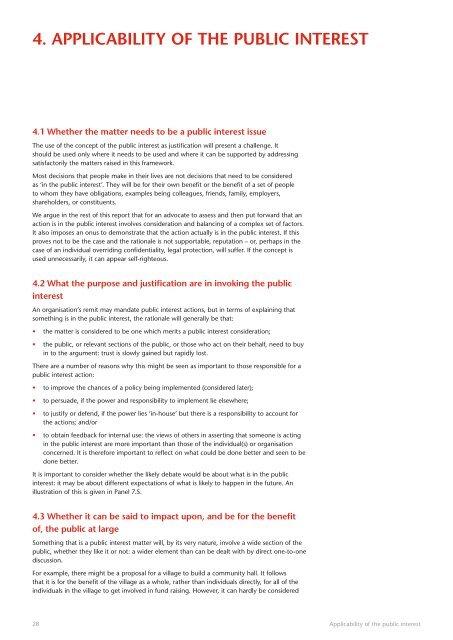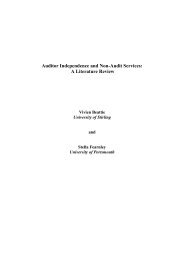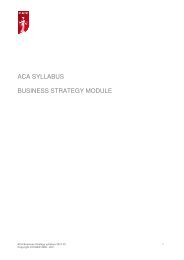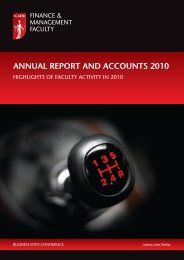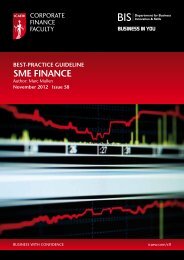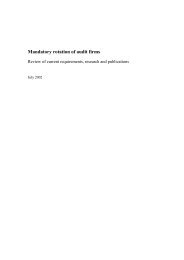4. APPLICABILITY OF THE PUBLIC INTEREST4.1 Whe<strong>the</strong>r <strong>the</strong> matter needs to be a <strong>public</strong> <strong>in</strong>terest issueThe use of <strong>the</strong> concept of <strong>the</strong> <strong>public</strong> <strong>in</strong>terest as justification will present a challenge. Itshould be used only where it needs to be used and where it can be supported by address<strong>in</strong>gsatisfactorily <strong>the</strong> matters raised <strong>in</strong> this <strong>framework</strong>.Most decisions that people make <strong>in</strong> <strong>the</strong>ir lives are not decisions that need to be consideredas ‘<strong>in</strong> <strong>the</strong> <strong>public</strong> <strong>in</strong>terest’. They will be <strong>for</strong> <strong>the</strong>ir own benefit or <strong>the</strong> benefit of a set of peopleto whom <strong>the</strong>y have obligations, examples be<strong>in</strong>g colleagues, friends, family, employers,shareholders, or constituents.We argue <strong>in</strong> <strong>the</strong> rest of this report that <strong>for</strong> an advocate to assess and <strong>the</strong>n put <strong>for</strong>ward that anaction is <strong>in</strong> <strong>the</strong> <strong>public</strong> <strong>in</strong>terest <strong>in</strong>volves consideration and balanc<strong>in</strong>g of a complex set of factors.It also imposes an onus to demonstrate that <strong>the</strong> action actually is <strong>in</strong> <strong>the</strong> <strong>public</strong> <strong>in</strong>terest. If thisproves not to be <strong>the</strong> case and <strong>the</strong> rationale is not supportable, reputation – or, perhaps <strong>in</strong> <strong>the</strong>case of an <strong>in</strong>dividual overrid<strong>in</strong>g confidentiality, legal protection, will suffer. If <strong>the</strong> concept isused unnecessarily, it can appear self-righteous.4.2 What <strong>the</strong> purpose and justification are <strong>in</strong> <strong>in</strong>vok<strong>in</strong>g <strong>the</strong> <strong>public</strong><strong>in</strong>terestAn organisation’s remit may mandate <strong>public</strong> <strong>in</strong>terest actions, but <strong>in</strong> terms of expla<strong>in</strong><strong>in</strong>g thatsometh<strong>in</strong>g is <strong>in</strong> <strong>the</strong> <strong>public</strong> <strong>in</strong>terest, <strong>the</strong> rationale will generally be that:• <strong>the</strong> matter is considered to be one which merits a <strong>public</strong> <strong>in</strong>terest consideration;• <strong>the</strong> <strong>public</strong>, or relevant sections of <strong>the</strong> <strong>public</strong>, or those who act on <strong>the</strong>ir behalf, need to buy<strong>in</strong> to <strong>the</strong> argument: trust is slowly ga<strong>in</strong>ed but rapidly lost.There are a number of reasons why this might be seen as important to those responsible <strong>for</strong> a<strong>public</strong> <strong>in</strong>terest action:• to improve <strong>the</strong> chances of a policy be<strong>in</strong>g implemented (considered later);• to persuade, if <strong>the</strong> power and responsibility to implement lie elsewhere;• to justify or defend, if <strong>the</strong> power lies ‘<strong>in</strong>-house’ but <strong>the</strong>re is a responsibility to account <strong>for</strong><strong>the</strong> actions; and/or• to obta<strong>in</strong> feedback <strong>for</strong> <strong>in</strong>ternal use: <strong>the</strong> views of o<strong>the</strong>rs <strong>in</strong> assert<strong>in</strong>g that someone is act<strong>in</strong>g<strong>in</strong> <strong>the</strong> <strong>public</strong> <strong>in</strong>terest are more important than those of <strong>the</strong> <strong>in</strong>dividual(s) or organisationconcerned. It is <strong>the</strong>re<strong>for</strong>e important to reflect on what could be done better and seen to bedone better.It is important to consider whe<strong>the</strong>r <strong>the</strong> likely debate would be about what is <strong>in</strong> <strong>the</strong> <strong>public</strong><strong>in</strong>terest: it may be about different expectations of what is likely to happen <strong>in</strong> <strong>the</strong> future. Anillustration of this is given <strong>in</strong> Panel 7.5.4.3 Whe<strong>the</strong>r it can be said to impact upon, and be <strong>for</strong> <strong>the</strong> benefitof, <strong>the</strong> <strong>public</strong> at largeSometh<strong>in</strong>g that is a <strong>public</strong> <strong>in</strong>terest matter will, by its very nature, <strong>in</strong>volve a wide section of <strong>the</strong><strong>public</strong>, whe<strong>the</strong>r <strong>the</strong>y like it or not: a wider element than can be dealt with by direct one-to-onediscussion.For example, <strong>the</strong>re might be a proposal <strong>for</strong> a village to build a community hall. It followsthat it is <strong>for</strong> <strong>the</strong> benefit of <strong>the</strong> village as a whole, ra<strong>the</strong>r than <strong>in</strong>dividuals directly, <strong>for</strong> all of <strong>the</strong><strong>in</strong>dividuals <strong>in</strong> <strong>the</strong> village to get <strong>in</strong>volved <strong>in</strong> fund rais<strong>in</strong>g. However, it can hardly be considered28Applicability of <strong>the</strong> <strong>public</strong> <strong>in</strong>terest
to be a <strong>public</strong> <strong>in</strong>terest matter: first, most of <strong>the</strong> <strong>public</strong> is excluded from <strong>the</strong> matter by scope;second, those affected can be <strong>in</strong>teracted with directly; and third, people are ultimately entitlednot to co-operate, although <strong>the</strong>y may not be popular. As noted <strong>in</strong> Panel 5.1, it would pass<strong>the</strong> charitable <strong>public</strong> benefit test, but that is approach<strong>in</strong>g it from <strong>the</strong> perspective of whe<strong>the</strong>rcharitable status is permissible, not what <strong>the</strong> best way is to argue <strong>for</strong> <strong>the</strong> existence of <strong>the</strong> hall.By contrast, proposals that affect, say, air quality or corruption <strong>in</strong> government must be <strong>public</strong><strong>in</strong>terest matters: <strong>the</strong>y will affect at <strong>the</strong> very least a large proportion of <strong>the</strong> populace, whocannot all be spoken with directly, and who do not have a right of opt-out, regardless of <strong>the</strong>circumstances.4.3.1 Disclosure <strong>in</strong> <strong>the</strong> <strong>public</strong> <strong>in</strong>terestThe UK’s National Union of Journalists’ Ethics Council and <strong>the</strong> UK Press Compla<strong>in</strong>tsCommission, <strong>in</strong> its Editors’ Code, have drawn up detailed def<strong>in</strong>itions of <strong>the</strong> <strong>public</strong> <strong>in</strong>terest, usedto justify overrides of a presumption of privacy. Both of <strong>the</strong>se <strong>in</strong>clude (among o<strong>the</strong>r th<strong>in</strong>gs) <strong>the</strong>phrase ‘There is a <strong>public</strong> <strong>in</strong>terest <strong>in</strong> <strong>the</strong> freedom of expression itself.’ 85However, <strong>the</strong> concern, as with o<strong>the</strong>r areas, is that <strong>public</strong> <strong>in</strong>terest is be<strong>in</strong>g used as a justification<strong>for</strong> self-<strong>in</strong>terest – which <strong>in</strong> this case would be that <strong>public</strong>ity sells newspapers and advancesjournalists’ careers. Courts have often been required to <strong>in</strong>tervene and <strong>in</strong> English law a significantamount of case law has been built up about press coverage and <strong>the</strong> <strong>public</strong> <strong>in</strong>terest. This has<strong>in</strong>cluded, <strong>for</strong> example, <strong>the</strong> relatively recent Reynolds v Times Newspapers and Jameel andO<strong>the</strong>rs v Wall Street Journal Europe cases. These both considered qualified privilege, which is apotential <strong>public</strong> <strong>in</strong>terest defence aga<strong>in</strong>st defamation allegations, and seeks to balance freedomof expression with <strong>the</strong> right to reputation.Underly<strong>in</strong>g qualified privilege is what was summarised <strong>in</strong> <strong>the</strong> Reynolds case as ‘whe<strong>the</strong>r <strong>the</strong><strong>public</strong> was entitled to know <strong>the</strong> particular <strong>in</strong><strong>for</strong>mation.’ The Jameel case positioned <strong>the</strong> level ofentitlement as somewhere between prurient <strong>in</strong>terest and necessity. 86The Reynolds case established a number of factors to consider when determ<strong>in</strong><strong>in</strong>g whe<strong>the</strong>r‘qualified privilege’ applied – that is, when <strong>the</strong> <strong>public</strong> <strong>in</strong>terest can be applied as a defenceaga<strong>in</strong>st defamation actions. These have now largely been <strong>in</strong>cluded <strong>in</strong> <strong>the</strong> UK’s draft DefamationBill 2011 87 and cover:• nature and context of <strong>public</strong>ation;• seriousness of imputation;• extent to which matter is of <strong>public</strong> <strong>in</strong>terest;• <strong>in</strong><strong>for</strong>mation known be<strong>for</strong>e <strong>public</strong>ation and anyth<strong>in</strong>g known about its reliability;• extent of claimants’ views be<strong>for</strong>e <strong>public</strong>ation;• extent of verification of accuracy;• tim<strong>in</strong>g of <strong>public</strong>ation and need <strong>for</strong> urgency; and• tone of <strong>the</strong> statement. 88In o<strong>the</strong>r words, someth<strong>in</strong>g that is of <strong>public</strong> <strong>in</strong>terest is someth<strong>in</strong>g that is <strong>for</strong> <strong>the</strong> benefit ordetriment of <strong>the</strong> <strong>public</strong>, not someth<strong>in</strong>g that is merely fasc<strong>in</strong>at<strong>in</strong>g to <strong>the</strong> <strong>public</strong>. The UKIn<strong>for</strong>mation Commissioner’s Office guidance on <strong>the</strong> Freedom of In<strong>for</strong>mation Act similarlyobserves that <strong>the</strong> dist<strong>in</strong>ction needs to be borne <strong>in</strong> m<strong>in</strong>d. 89The issue of over-rid<strong>in</strong>g contractual or professional obligations of confidentiality to report, <strong>for</strong>example, fraud or o<strong>the</strong>r illegal acts, similarly requires a series of factors to be considered. The UKPublic Interest Disclosure Act <strong>in</strong>dicates that <strong>the</strong> matters to be considered <strong>in</strong> order to determ<strong>in</strong>ewhe<strong>the</strong>r confidentiality should be breached <strong>in</strong>clude: whe<strong>the</strong>r members of <strong>the</strong> <strong>public</strong> are likelyto be affected; whe<strong>the</strong>r corrective action is be<strong>in</strong>g taken; possibility of repetition; <strong>the</strong> gravity of<strong>the</strong> matter; <strong>the</strong> presence of a general ethos of disregard<strong>in</strong>g <strong>the</strong> law; reliability and quality of<strong>in</strong><strong>for</strong>mation available and <strong>the</strong> degree of suspicion; and legal protection <strong>for</strong> breach of duty ofconfidentiality. 9085National Union of Journalists, ‘The Public Interest’, Press Compla<strong>in</strong>ts Commission, ‘Editors Code’.86Joyce, The Reynolds Public Interest Defence, referr<strong>in</strong>g to Reynolds v Times Newspapers [2001] 2 AC 127 and Jameel and O<strong>the</strong>rs v WallStreet Journal Europe Sprl [2006] UKHL 144.87Await<strong>in</strong>g Parliamentary debate at <strong>the</strong> time of writ<strong>in</strong>g.88M<strong>in</strong>istry of Justice, ‘Draft Defamation Bill’.89In<strong>for</strong>mation Commissioners Office, Freedom of In<strong>for</strong>mation Act, Awareness Guidance 3.90Audit<strong>in</strong>g Practices Board, ‘ISA (UK and Ireland) 250 Section A’.Applicability of <strong>the</strong> <strong>public</strong> <strong>in</strong>terest29
- Page 1 and 2: ACTING IN THE PUBLIC INTEREST:A FRA
- Page 3: ACTING IN THE PUBLIC INTEREST:A FRA
- Page 9: Our framework is based around the k
- Page 12 and 13: The answers to these questions will
- Page 14 and 15: 2. INTRODUCTION2.1 Concepts of the
- Page 16 and 17: Accordingly, this report addresses
- Page 18 and 19: Panel 2.4: ICAEW and its public int
- Page 20 and 21: The Mediterranean republics needed
- Page 22 and 23: We set out a framework for discussi
- Page 24 and 25: 3. CREDENTIALS FOR INVOKINGTHE PUBL
- Page 26 and 27: By and large producers operate in s
- Page 29 and 30: the UK government set up a ‘Commi
- Page 31: 4. APPLICABILITY OF THE PUBLIC INTE
- Page 35: This highlights that there may be p
- Page 38 and 39: 5. THE RELEVANT PUBLIC5.1 ScopeIn o
- Page 40 and 41: 5.3 Geographical exclusionsGeograph
- Page 42 and 43: 6. THE RELEVANT PUBLIC’S WANTS6.1
- Page 44 and 45: • work, that is having some, havi
- Page 46 and 47: Panel 6.3: Weisbrod’s public inte
- Page 48 and 49: Having sought out representative op
- Page 50 and 51: 7. CONSTRAINTS TO WANTS7.1 Self-int
- Page 52 and 53: In terms of whether the relevant pu
- Page 54 and 55: Panel 7.5: Management of national d
- Page 56 and 57: Panel 7.6: ICAEW and clarity of val
- Page 58 and 59: 8. AGGREGATION AND DECISION8.1 Base
- Page 60 and 61: Other ethical decision-making model
- Page 62 and 63: In this instance, while national se
- Page 65 and 66: 9. IMPLEMENTATIONA proposed action
- Page 67 and 68: • giving up where targets seem un
- Page 69 and 70: 9.2.1 Government authorityAt the st
- Page 71 and 72: 9.3 Infrastructure and support tool
- Page 73 and 74: 12. The framework proposes a signif
- Page 75 and 76: ibliographyAdler, Jonathan H, Perve
- Page 77 and 78: Goldstein, Eric A, ‘Defining the
- Page 79 and 80: Persky, Joseph, ‘Retrospectives:
- Page 81: The ICAEW is a founder member of th


